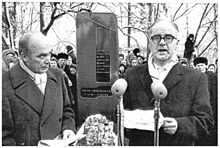Oscar Parland

Oscar Percival Parland (born April 20, 1912 in Kiev , † September 27, 1997 in Helsinki ) was a Finnish-Swedish writer , translator and psychiatrist . His brothers were the writers Henry and Ralf Parland .
Life
Oscar Parland was the son of the engineer Oswald Parland and his wife Marie Julia Sesemann. The British ancestor Parlands moved to St. Petersburg to work for Tsarina Katarina , his mother came from a Baltic-German family known in Vyborg . The Parland family, like many other families in the cosmopolitan western Russia of the time, spoke German, Russian and Finnish. To escape the turmoil of the Russian Revolution, the family moved to Finland in 1912 . Parland only learned Swedish by attending school in Grankulla . Oscar Parland later said of himself that he was English, born in Russia with German as his mother tongue, that he had attended a Swedish-language school, but was a Finnish citizen.
Parland dreamed of becoming a composer but studied medicine at Helsinki University until 1944 . In 1941 he married the critic and translator Heidi Enckell, who divorced her first husband, the writer and painter Rabbe Enckell . Parland later dealt with this love triangle between Heidi, Rabbe and him in the drama Flannelkostym och farsans käpp (2003). The Winter War (1939–40) and the Continuation War (1941–44) between Finland and the Soviet Union led to a severe depression in Parlands. He still served in the army, despite being a pacifist . After recovering from a mental breakdown, he was assigned to Lapinlahti Hospital . During the Continuation War, Parland worked as a psychiatrist in Pitkäniemi Military Psychiatry. After working as a doctor in various hospitals, he had his own psychiatric practice from 1952 to 1978.
In the late 1940s, Parland was a music critic for the Arbetarbladet newspaper . In 1948 he and other Finnish-Swedish authors joined the left-wing literary association Kiila ("Wedge").
Parland's novellas show the influence of Thomas Mann , Marcel Proust and Juri Olescha , a prominent figure in Russian Expressionism . At the age of fifty, Parland met Gunnar Björling , the pioneer of Finnish-Swedish modernism , and later Rabbe Enckell and Elmer Diktonius . Modernist free expression with unfettered ingenuity was typical of Parland's work. Parland created only a few works. However, his psychoanalytic training always influenced his writing.
Works (selection)
- Förvandlingar , 1945
- The förtrollade vägen , 1953
- Tjurens år , 1962
- Kunskap och inlevelse , 1991
- Spegelgossen , 2001
- Flannelkostym och farsans käpp , 2003
Prizes and awards
- Literature award of the newspaper Svenska Dagbladet 1953
Web links
- Literature by and about Oscar Parland in the catalog of the German National Library
- Oscar Parland's biography on www.kirjasto.sci.fi ( memento of October 3, 2013 in the Internet Archive )
Individual evidence
- ↑ Book review, English
- ^ Ambassador René Nyberg: Greetings at the reading & discussion "Henry Parland - Zerbrebs" , accessed on April 17, 2010.
| personal data | |
|---|---|
| SURNAME | Parland, Oscar |
| ALTERNATIVE NAMES | Parland, Oscar Percival (full name) |
| BRIEF DESCRIPTION | Finnish-Swedish writer, translator and psychiatrist |
| DATE OF BIRTH | April 20, 1912 |
| PLACE OF BIRTH | Kiev |
| DATE OF DEATH | September 27, 1997 |
| Place of death | Helsinki |